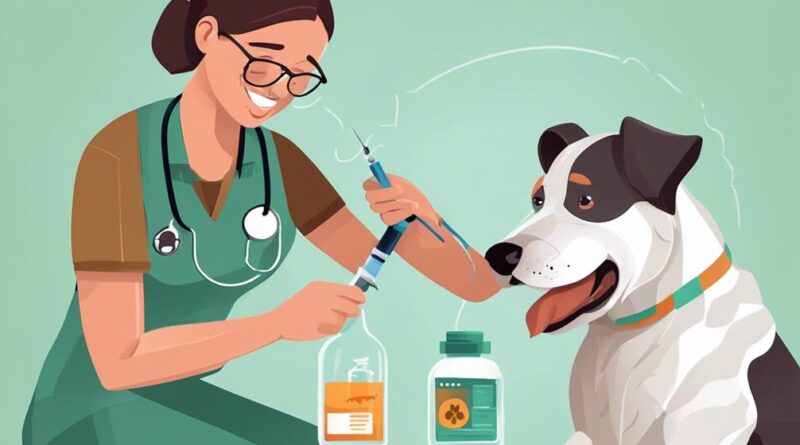How to Vaccinate Your Dog Against Lyme Disease
Protect your furry friend from Lyme disease by getting them vaccinated. Consult your veterinarian to discuss suitable vaccine options based on your dog's risk factors. Follow the recommended vaccine schedule, starting at 6-8 weeks old, with boosters until around 16 weeks, then annual shots. Be aware of potential side effects like allergic reactions and monitor your dog's health post-vaccination for any unusual symptoms. Remember, vaccination is a proactive step towards ensuring your dog's well-being and preventing the spread of Lyme disease.
Understanding Lyme Disease in Dogs
To fully grasp the importance of vaccinating your dog against Lyme disease, it's crucial to understand the impact this tick-borne illness can have on your canine companion. Lyme disease is caused by the bacterium Borrelia burgdorferi, which is transmitted through the bite of infected black-legged ticks, also known as deer ticks. These ticks are prevalent in wooded or grassy areas and can easily latch onto your dog during outdoor activities.
Prevention methods play a key role in protecting your furry friend from Lyme disease. One of the most effective prevention strategies is tick control. Regularly inspecting your dog for ticks after walks or hikes and promptly removing any ticks you find can significantly reduce the risk of transmission. Additionally, using tick preventatives recommended by your veterinarian can help repel and kill ticks before they have a chance to transmit the bacteria.
Tick control not only involves preventive measures for your dog but also includes managing the tick population in your environment. Keeping your yard well-maintained by mowing the grass, removing leaf litter, and creating a barrier between wooded areas and your living space can help minimize the presence of ticks. By implementing these prevention methods and practicing tick control, you can lower the risk of your dog contracting Lyme disease and ensure their continued health and well-being.
Importance of Vaccinating Your Dog
Vaccinating your dog against Lyme disease is essential for safeguarding their health and preventing the spread of this tick-borne illness. Preventative measures play a crucial role in ensuring your dog's well-being, and vaccination is a cornerstone of disease prevention protocols.
Lyme disease is caused by the bacterium Borrelia burgdorferi, which is transmitted through the bite of infected ticks. These tiny parasites can latch onto your dog during outdoor activities, exposing them to the risk of contracting the disease. By vaccinating your dog, you're taking a proactive step to reduce the likelihood of them developing Lyme disease if they come into contact with infected ticks.
As a responsible pet owner, it's your duty to prioritize your dog's health and safety. Vaccination acts as a shield, strengthening your dog's immune system against the potential threat of Lyme disease. This simple yet effective measure can save your dog from unnecessary suffering and complications associated with the illness.
Incorporating vaccination into your dog's routine healthcare not only protects them but also contributes to the overall community's health by reducing the prevalence of Lyme disease. Remember, disease prevention is always better than cure, and vaccinating your dog is a key component of keeping them healthy and happy for years to come.
Signs and Symptoms of Lyme Disease
Protecting your dog's health involves recognizing the signs and symptoms of Lyme disease, which can manifest in various ways. Early detection is crucial in preventing the disease from progressing. One of the most common signs of Lyme disease in dogs is lameness, which may shift from one leg to another. Your dog may also show signs of joint pain, swelling, and reluctance to move. In some cases, they might experience lethargy, fever, and loss of appetite.
To ensure early detection, it's important to conduct regular tick checks on your furry friend, especially after outdoor activities. Removing ticks promptly and using preventatives can significantly reduce the risk of Lyme disease transmission. Keep your dog's environment clean and well-maintained to minimize the presence of ticks.
If you notice any of the aforementioned symptoms or suspect that your dog may have been exposed to ticks, consult your veterinarian immediately. They can perform tests to confirm the presence of Lyme disease and recommend appropriate treatment options. Remember, prevention measures and proactive care are key in safeguarding your dog's well-being. Early intervention is essential in managing Lyme disease effectively.
Consultation With a Veterinarian
Upon observing any concerning symptoms or potential tick exposure in your dog, prompt consultation with a veterinarian is imperative for accurate diagnosis and timely treatment. Preventive measures play a crucial role in safeguarding your furry companion against Lyme disease. Your veterinarian can provide guidance on effective tick control methods, such as topical treatments, tick collars, and environmental management to reduce tick habitats in your surroundings.
When discussing Lyme disease prevention with your veterinarian, you'll likely explore vaccine options. Vaccination is a proactive approach to protect your dog from Lyme disease, especially in regions where ticks are prevalent. Your veterinarian can recommend suitable vaccines based on your dog's risk factors and lifestyle. They'll explain the vaccination process, potential side effects, and the optimal timing for administering the vaccine.
During your consultation, don't hesitate to ask questions or seek clarification on any concerns you may have regarding Lyme disease and its prevention. Your veterinarian is a valuable resource in helping you make informed decisions about your dog's health. By collaborating with your veterinarian and following their recommendations on preventive measures and vaccine options, you can effectively reduce the risk of Lyme disease in your beloved pet.
Vaccine Schedule for Dogs
When establishing a comprehensive healthcare plan for your dog, understanding the recommended vaccine schedule is crucial for maintaining their well-being. Preventive measures are key in safeguarding your furry friend against various diseases, including Lyme disease. Following a vaccination protocol tailored to your dog's specific needs is essential.
Puppies typically start their vaccination series between 6 to 8 weeks of age. This initial round of vaccines helps protect against common diseases like distemper, parvovirus, and adenovirus. Boosters are then administered every 3-4 weeks until they're around 16 weeks old. After this initial series, annual booster shots are generally recommended to maintain immunity.
When it comes to Lyme disease prevention specifically, a vaccine is available for dogs at risk of exposure to infected ticks. The Lyme disease vaccine is often recommended for dogs living in or traveling to endemic regions where the disease is prevalent. Your veterinarian will help determine if this vaccine is necessary based on your dog's lifestyle and environment.
Side Effects and Risks
To understand the potential side effects and risks associated with vaccinating your dog against Lyme disease, it's essential to consult with your veterinarian for detailed information tailored to your pet's specific health needs. While vaccines are generally safe and effective, there are some risks to be aware of. One potential risk is the possibility of allergic reactions. Just like with any medication or vaccine, dogs can have allergic responses to the Lyme disease vaccine. Signs of an allergic reaction may include swelling, itching, hives, or more severe symptoms like difficulty breathing. If you notice any of these signs after vaccination, it's crucial to seek immediate veterinary care.
Another aspect to consider is the potential for long-term effects. While the Lyme disease vaccine is designed to protect your dog from the harmful effects of the disease, there may be long-term consequences associated with the vaccine itself. These effects could include things like autoimmune reactions or other chronic conditions. It's important to weigh the risks of these potential long-term effects against the benefits of vaccinating your dog, especially if you live in an area where Lyme disease is prevalent.
Post-Vaccination Care Tips

For optimal health outcomes after vaccinating your dog against Lyme disease, implement these essential post-vaccination care tips.
After your dog has been vaccinated against Lyme disease, it's crucial to adhere to certain post-vaccination care guidelines. Firstly, consider any dietary restrictions that your veterinarian may recommend. Some dogs may experience mild gastrointestinal upset after vaccination, so sticking to a bland diet for the next 24 hours can help alleviate any potential issues. Ensure your dog has access to fresh water at all times to stay hydrated.
Additionally, it's important to be mindful of exercise limitations following the vaccination. While regular exercise is vital for your dog's overall health, it's advisable to avoid strenuous physical activity for the next 24-48 hours post-vaccination. This precaution can help reduce the risk of muscle soreness or fatigue that may occur as a result of the vaccination.
Monitoring Your Dog's Health
After your dog's Lyme disease vaccination, closely monitor their health to ensure any potential adverse reactions are promptly addressed. Health tracking is crucial in the days following the vaccination. Keep an eye on your dog for any unusual symptoms or behaviors that could indicate a negative reaction to the vaccine.
Symptom awareness is key in monitoring your dog's health post-vaccination. Watch out for symptoms such as lethargy, loss of appetite, vomiting, diarrhea, or swelling at the injection site. These could be signs of a possible adverse reaction that needs immediate attention from a veterinarian.
Maintain a health journal to track any changes or concerns. Note down your dog's daily behavior, appetite, water intake, and any symptoms observed. This record will help you detect any patterns or abnormalities, aiding in prompt intervention if needed.
Regularly check the injection site for any signs of redness, swelling, or pain. If you notice any of these symptoms, contact your vet for further guidance. Remember, early detection and intervention are crucial in managing any potential health issues that may arise post-vaccination.
Frequently Asked Questions
Can My Dog Still Get Lyme Disease After Being Vaccinated?
Even after vaccination, your dog can still get Lyme disease. Vaccine efficacy isn't 100%, and there's always a small risk of infection.
Disease transmission can occur if your dog is bitten by an infected tick that the vaccine may not fully protect against.
It's crucial to continue preventive measures, such as tick control and regular check-ups, even if your dog has been vaccinated against Lyme disease.
Are There Any Alternative Methods to Prevent Lyme Disease in Dogs?
To prevent Lyme disease in dogs, you may consider natural remedies like herbal supplements. These can help boost your pet's immune system and make them less attractive to ticks.
While vaccination is effective, these alternative methods can be additional layers of protection.
Always consult with your vet before starting any new regimen to ensure it's safe and appropriate for your furry friend.
How Long Does the Lyme Disease Vaccine Protection Last?
Vaccine effectiveness determines how long the protection lasts.
Booster shots help maintain immunity duration.
Be aware of possible side effects.
Can My Dog Spread Lyme Disease to Other Pets or Humans?
Yes, your dog can spread Lyme disease to other pets or humans through tick bites.
To reduce transmission risks, regularly check your dog for ticks, especially after being in wooded or grassy areas. Ensure your pet is on tick prevention medication recommended by your vet.
Additionally, consider vaccinating your dog against Lyme disease to further protect them and prevent the spread of this illness to others.
What Should I Do if My Dog Misses a Scheduled Vaccine Dose?
If your dog misses a scheduled vaccine dose, contact your vet promptly. Vaccine effectiveness can decrease if doses are missed, potentially leaving your dog vulnerable to infections.
Your vet will advise on the best course of action to ensure your dog remains protected. Missing doses can increase the potential risks of contracting diseases, so it's crucial to stay on schedule to maintain your dog's immunity.
Conclusion
In conclusion, vaccinating your dog against Lyme disease is essential in protecting their health and well-being.
By understanding the signs and symptoms of the disease, consulting with a veterinarian, following the recommended vaccine schedule, and monitoring your dog's health post-vaccination, you can ensure they stay safe and healthy.
Remember, prevention is key when it comes to protecting your furry friend from this potentially serious illness.
